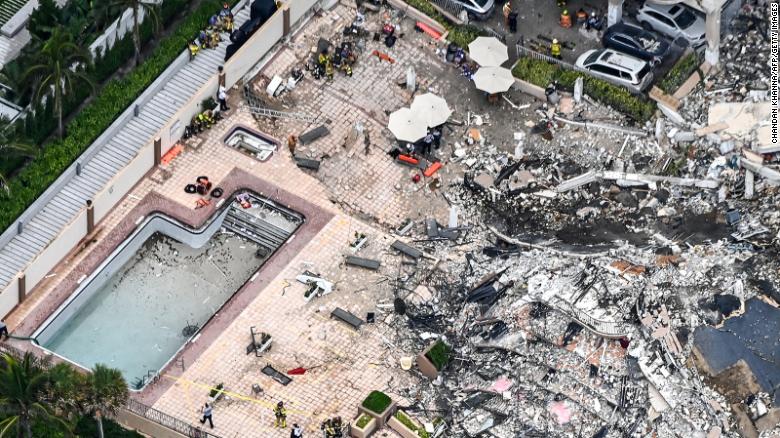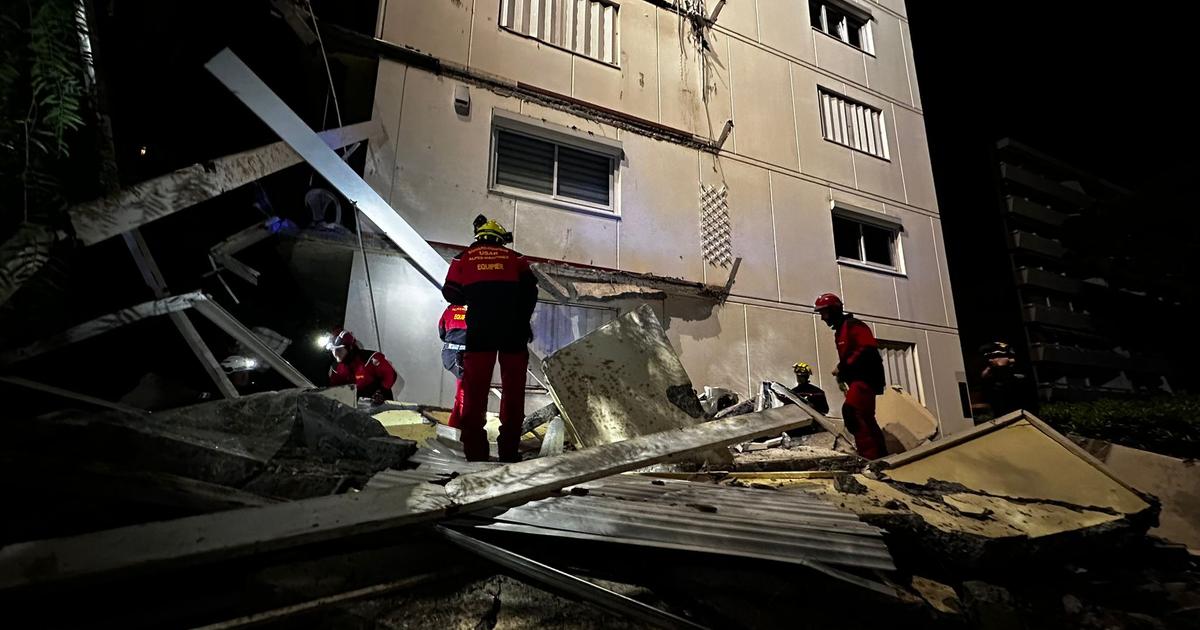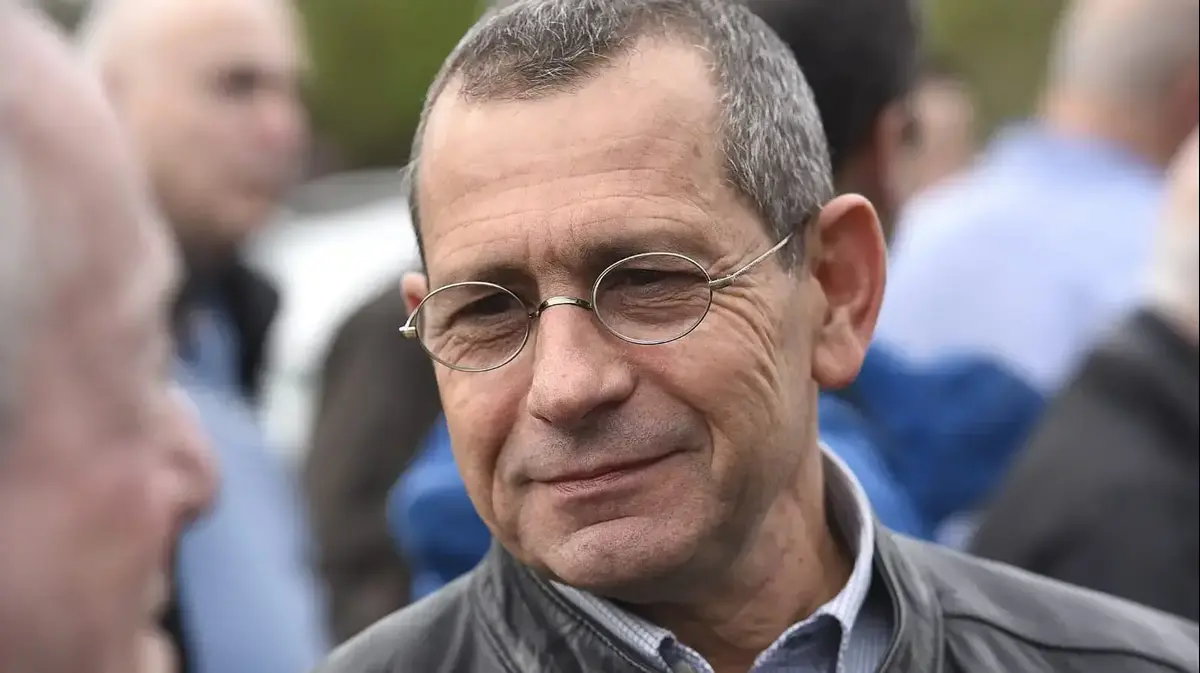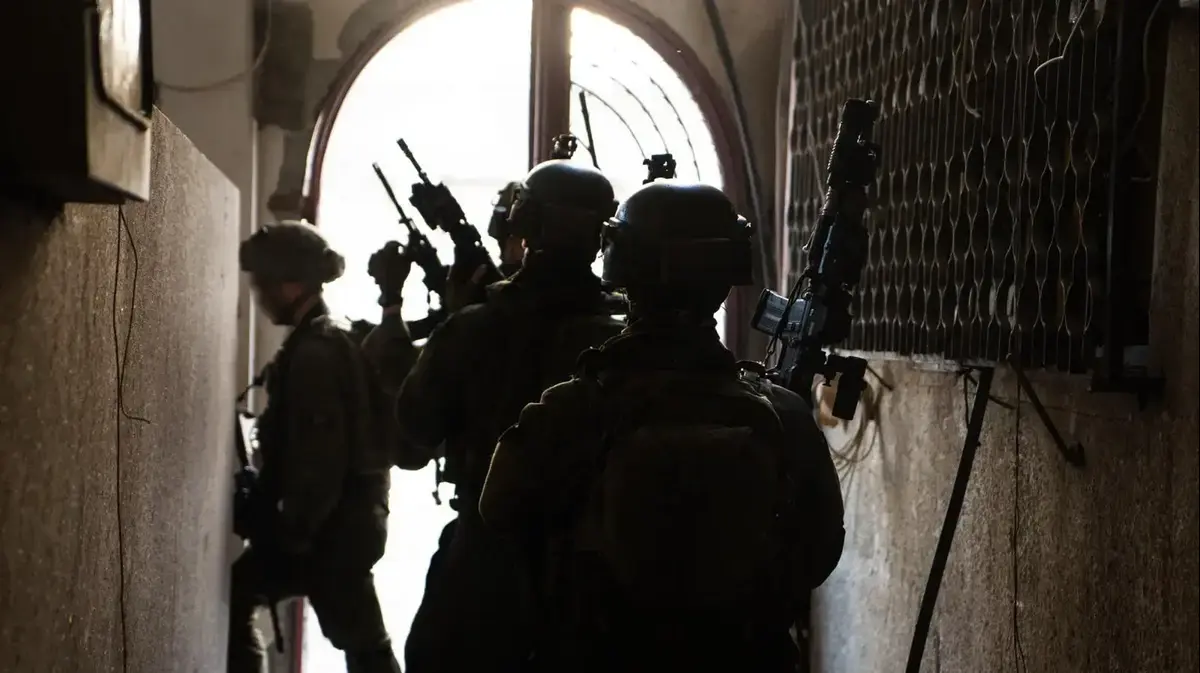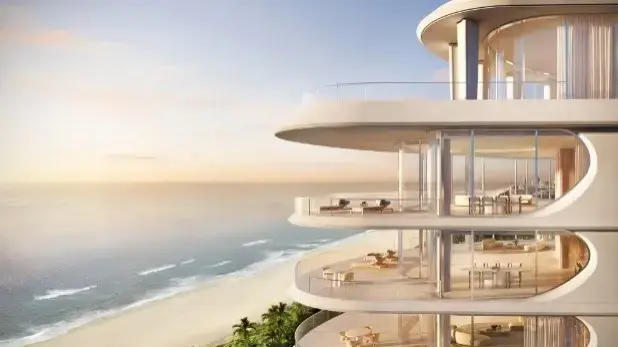Compensation to the victims of Surfide 4:33
(CNN) -
Firefighters used a crane to lift Steve Rosenthal from the balcony of his apartment 705 after the Champlain Towers South in Surfside, Miami, partially collapsed last month.
Steve Rosenthal, an advertising executive, escaped the building with just a few items in a paper bag, including a T-shirt, pants and his wallet.
Now she lives in a hotel paid for by friends and wears donated clothes.
And he's worried about what awaits him at the site of the collapse, in which at least 97 people have died.
Rosenthal still owes money for the two-bedroom apartment he bought 20 years ago, and he wants a solution that provides the fastest financial recovery for the survivors and the families of the victims.
"I lost everything, my life is totally upside down, the people I called friends are gone," he told CNN.
"I'm 72 years old, I can't spend the rest of my life trying to rebuild. Whatever they do, they have to compensate people."
advertising
He would also like to see some kind of monument at the site to honor the lives of the deceased.
But solving the area's long-term future - the site of a deadly catastrophe that is also valuable beachfront land - will likely be complex.
And, judging by what happened at the sites of other massive tragedies, it will take a while.
They look for scammers who stole the identity of deceased in the collapse of Miami to buy products
Some survivors do not want reconstruction in the area of the collapsed building in Miami
The land has been cleared for the most part and its debris has been moved to a collection site as evidence for investigations into the collapse.
Miami-Dade Circuit Judge Michael Hanzman appointed a Receiver, Attorney Michael Goldberg, to oversee the complicated legal and financial issues involved, and explore the value of the land as a possible source of compensation for victims.
Hanzman also ordered the start of the land sale process, which could fetch up to $ 110 million, said Christina Pushaw, spokesman for Florida Gov. Ron DeSantis.
The judge said this week that proceeds from the sale should go directly to the survivors and the families of the victims.
Miami-Dade Circuit Judge Michael Hanzman listens as renters and condo owners share their views on the site of the Champlain Towers South building that collapsed in Surfside, Miami, Florida.
Some relatives of the victims say they do not want another residential building erected at the site.
"I'm not saying the land is not sold. The land has to be sold and we need to be compensated for what happened," Martin Langesfeld, whose sister died in the landslide, told CNN affiliate WFOR.
But Langesfeld said he would rather have Miami-Dade County or another government agency buy the land and not build new condominiums on it so that "the families of the victims get the dignity and respect we are looking for."
And he added: "Would you want to live where your family died?"
Soriya Cohen, whose husband, Brad Cohen, was killed in the building collapse, also said she doesn't want a new building built on the property.
Instead, he added, the entire land should be reserved as a memorial to the deceased.
"I can't even imagine such a desecration. Imagine that that was your spouse, your father or your grandfather and they built on top of it to earn money," Cohen told CNN affiliate WPLG.
"I ask people to respect that, and to respect the families and people who have already suffered a lot and not to increase our pain."
Search and rescue personnel work at the site after the partial collapse of Champlain Towers South.
Cohen's concern is based in part on the Jewish tradition of respecting the dead and the sanctity of burial sites.
Many of the building's victims were Jewish.
However, under Jewish funeral laws, the site would not be considered sacred if human remains found there were moved, said Michael Berenbaum, a Los Angeles rabbi and Jewish scholar who specializes in memorials.
Berenbaum said that what is ultimately done with the property "is a social and political decision, not a religious decision."
Should the way you search buildings in Miami change?
1:59
But others want new homes in the place
As a sign of the division in the matter, several apartment owners asked the judge in a hearing this week to allow a developer to build a new building on the site.
Beachfront residential properties are highly sought after in this tropical community of about 5,800 residents, where palm trees flood the streets.
"Some people want a memorial, but there is a group of people who had houses there who want to go back to the place," said Surfside Mayor Charles W. Burkett.
"The challenge will be to balance both interests. We understand that very well, and the receivers are hypersensitive to the needs of those who have lost loved ones."
In a photo released by the Miami-Dade Fire Department on July 10, crews work at the site of the building collapse.
The process to determine what happens to the terrain will be based on three steps.
Goldberg, the receivership, will determine what the majority of condo owners want and issue recommendations to the judge, who will ultimately make the final decision, Mayor Burkett said.
State officials will have nothing to say on the matter, according to DeSantis' office.
"The use of the land is not up to the state, because it is not public land," said Pushaw, the governor's spokesman.
"Survivors have expressed differing opinions on what to do with the land, with some suggesting that it should be sold to the local or state government, and some wanting to sell to a private developer to rebuild on the site so they can return to the place they still consider to be their home."
Burkett said he has been in constant conversations with the families of the victims.
One option could be a compromise: a memorial next to a new residential building for people who want to live there again, he noted.
Burkett added that his preference will be narrowed down to the receivers 'recommendation, based on conversations with the victims' loved ones.
Judge Hanzman stated that he expects the cases to be resolved within a year.
Miami firefighters transfer to the police the recovery work in the rubble of the collapsed building
Other sites of mass tragedies were turned into memorials
Over the years, the sites of other massive tragedies, such as the September 11 attack on the Twin Towers in New York and the 1995 Oklahoma City bombing, have been converted into memorials for the people who died.
There is also a memorial in a plaza in Kansas City, near where 114 people died in 1981 when two access bridges to the Hyatt Regency hotel collapsed.
The hotel was renovated and renamed, but it is still running.
The southern area at the monument to the Twin Towers in New York.
But these types of monuments can be a collection of local, state and federal recommendations, and take years to carry out.
Residents of Newtown, Connecticut, just voted this spring to build a memorial to the 26 people killed by a mass shooter in 2012 at Sandy Hook Elementary School.
In Las Vegas, where a 2017 shooting at a country music festival left 58 dead, plans for a memorial are still underway nearly four years later.
And last month, the U.S. Senate passed a measure designating the site of the deadly 2016 Orlando Pulse nightclub shooting a national monument.
"The Pulse nightclub is a consecrated place," said President Joe Biden, who signed the law days later.
People visit a makeshift memorial in Orlando on June 12, 2017, a year after the Pulse nightclub shooting.
Despite calls to convert the Miami site into a memorial, survivors and families of victims will not be asked to donate their share of property, Judge Hanzman said.
"These victims who have lost their homes, their personal belongings and, in many cases, their lives are not going to sacrifice the value of their real property for the public good," said Hanzman, who oversees civil lawsuits filed after the collapse.
"The task of this court and yours is to compensate the victims of this tragedy, period," he told lawyers at a hearing this week.
Whatever happens, you will never live at the site in Miami again.
Meanwhile, Rosenthal and other survivors of the collapse try to rebuild their lives.
She is one of dozens of people being helped by the Global Empowerment Mission, which distributes funds, housing assistance and gift cards to survivors.
Your friends have also created a GoFundMe to help you recover.
Rosenthal cannot forget that terrifying night on June 24, when he woke up to a thunderous sound, thinking he was dreaming of an earthquake in California.
With her apartment shaking and her bed rocking, she realized it was real as the dust rolled down from the ceiling onto her face.
He said he could hear his neighbors yelling, "Help! Help!"
"I ran out onto the balcony to see what was going on. I was hit by a plume of smoke that stunned me. I thought, 'Whatever this is, Rosenthal, now you're on it.'
He also remembers the agonizing minutes he spent waiting on his balcony to be rescued.
In between searching for a new home, Rosenthal is now attending Zoom court hearings on what will happen to the land where his building stood.
Regardless of what the court decides, he said he hopes to find a new home a few miles away in Miami Beach.
He has no plans to relocate to the Champlain Towers South site.
CNN's Tina Burnside contributed to this report.
Miami

